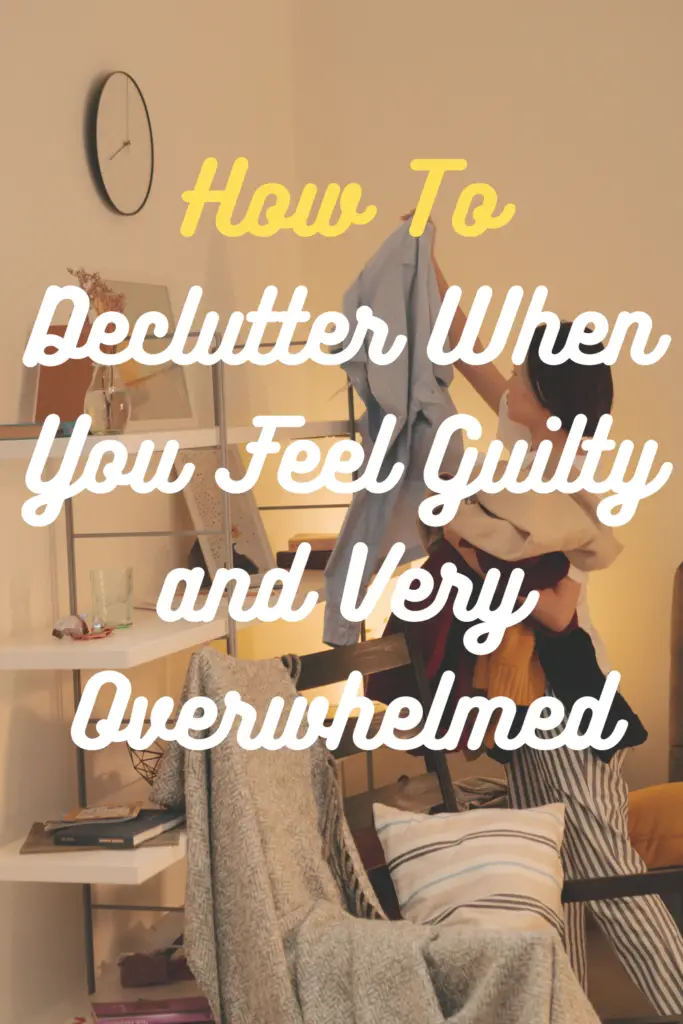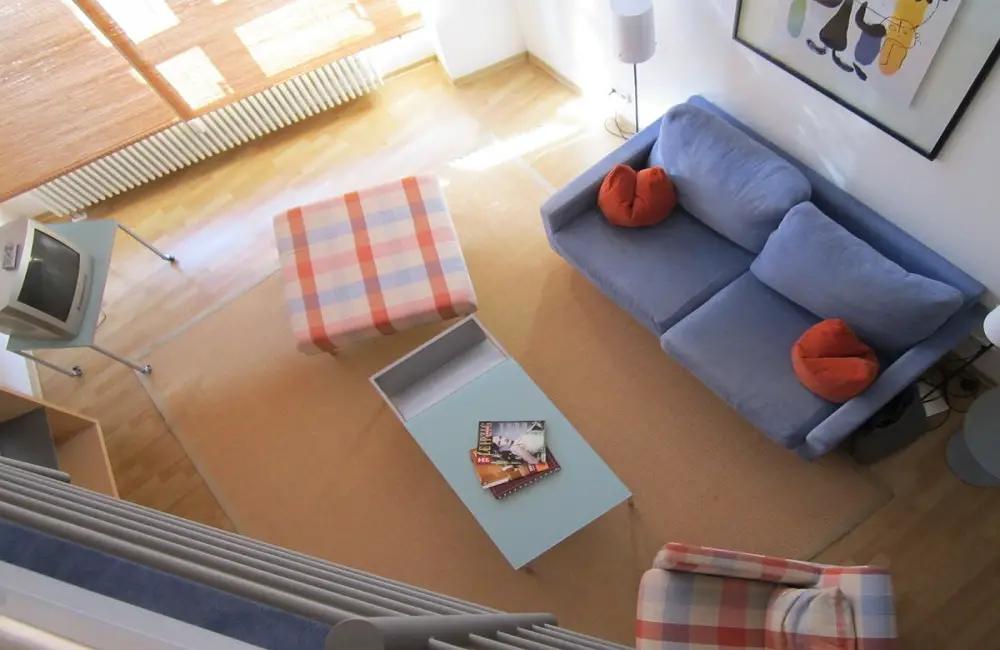When it comes to decluttering, do you ever experience feelings of guilt? While many individuals find great satisfaction in the process of organizing their living spaces, there are those who grapple with overwhelming emotions and a sense of guilt when parting with their belongings.
The mere thought of throwing things away can trigger immense guilt. This emotional, paralyzing cycle often prevents us from effectively decluttering and living in an organized environment.

Why Decluttering Causes Guilt and Overwhelm?
Before we can talk about how to overcome these emotions, it’s important to understand why they exist. More often than not, guilty feelings come from attachments and sentimental values to objects that we own.
We can’t seem to let go of things and fear that we’re losing a part of ourselves when we do. On the other hand, overwhelm comes when we attempt to declutter too much at once, leaving us feeling like we don’t know where to start or what to do next.
It’s essential to note that these feelings are normal and valid but that they don’t have to stop us from decluttering altogether.
Decluttering Guilt
Decluttering guilt is a common experience that many people can relate to. It may seem confusing to some, but the emotions associated with discarding items can be intense.
The act of decluttering is often viewed as something that should bring about positive feelings, but what happens when it doesn’t?
What if the process actually elicits strong negative emotions? In such cases, it’s important to acknowledge and explore these conflicting feelings to find a more balanced approach to decluttering.
11 Common Signs
- One common experience is feeling a significant amount of guilt when disposing of items.
- Another aspect is the anxiety that arises when contemplating the act of decluttering and letting go of belongings.
- Additionally, there is often a sense of immense regret when engaging in the process of decluttering.
- It is not uncommon for individuals to feel sadness, and in some cases, even depression, when parting with their possessions.
- Furthermore, childhood memories of belongings being discarded without consent can lead to an excessive protectiveness over one’s belongings in the present.
- Moreover, there may be a greater concern about the impact on the environment rather than the state of personal space.
- Those who struggle with decluttering often worry about being labeled as a hoarder or packrat.
- The inability to discard items stems from the perception that they may potentially serve a purpose in the future.
- Another challenge is not knowing what to do with unwanted items that cannot simply be thrown away.
- Paradoxically, there can be a desire to dispose of everything and start anew, which is accompanied by a sense of guilt.
- The unexplained guilt associated with disposing of stuffed animals is considered a classic indication of Decluttering Guilt.
Many individuals experience a range of emotions such as guilt, anxiety, depression, regret, and worry when it comes to decluttering.
These feelings, collectively known as “Decluttering Guilt,” can create a serious and saddening situation. However, it is possible to overcome these barriers and declutter effectively without negative emotions.
Let’s explore how to effectively declutter and organize your belongings, especially when you struggle with discarding items that are “still usable” or “potentially useful to someone who can fix them.” It’s common to feel guilty about throwing things away because it can feel like a waste of money.
But there’s another reason for this guilt that is often overlooked. Some individuals form emotional attachments to their possessions, making it difficult for them to let go of stuffed animals or even a broken table because they don’t want anything to feel unwanted.
Therefore, it’s crucial to understand these emotions and overcome them in order to create a clutter-free and organized living environment.
How To Declutter Without Guilt?
- Take it one step at a time: Decluttering can feel like a daunting task, so break it down into manageable steps. Start with one room or category of items, such as clothing or books. Once you’ve tackled that area, move on to the next. This approach will make decluttering seem less overwhelming.
- Choose a donation center: It’s much easier to part with things when you know they’re going to a good cause. Find a local charity or donation center that accepts items that you’re planning to donate. Knowing that your unused items will be put to good use can help alleviate feelings of guilt.
- Ask yourself why you’re keeping something: When deciding whether to keep or discard something, ask yourself why you’re holding onto it. Is it sentimental? Are you keeping it for a “just in case” scenario? Understanding your reasoning can help you make a decision that feels right for you.
- Be honest with yourself: Sometimes, we hold onto things because we feel like we’re supposed to. If you’re holding onto something because you think it’s “valuable” or that it might be worth something someday, be honest with yourself about whether you truly need it.
- Celebrate progress: Decluttering isn’t always easy. It can be mentally and emotionally taxing to part with things, even if they don’t serve a purpose in your life anymore. To combat feelings of guilt, take time to celebrate your progress. Whether it’s treating yourself to a nice dinner or taking a day off, acknowledging hard work can help you stay motivated.
Should You Throw It Or Keep It?
Let’s break it down. If you’re struggling to decide whether to keep or toss something, ask yourself these questions:
Do I really need this? Does it bring me joy? Will I use it in the future? If the answer is yes, then keep it, but if any of these questions receive a hard no, it’s time to let it go. It’s that simple.
One common struggle is holding onto clothing items that may fit you someday. Let me remind you that holding onto something for the sake of “someday” is not actual joy. Sure, it’s great to have a goal in mind, but don’t wait around for that perfect moment.
Allow yourself to live in the present moment and let go of any guilty feelings when decluttering. It’s time to free up that closet space and fill it with clothes that fit you beautifully right now.
Another struggle that people go through is getting rid of gifts from loved ones. It can be tough to donate or toss something that was given to you by someone special. But tell me, how long will you hold onto something that you don’t use, need, or love?
If the answer is forever, it’s time to break free from that emotional guilt and let it go. If it’s something that’s close to your heart, consider gifting it to someone else who will enjoy it as much as you did.
Now, I’m not saying to throw everything out. There are things that you might want to hold onto for future use or sentimental purposes, like old photo albums or your grandma’s tea set. The key is to be more mindful and intentional with your possessions.
Do you use it often? Does it hold a special place in your heart? If yes, then keep it. It’s essential to keep things that bring you joy and add value to your life.
Finally, decluttering isn’t just about getting rid of things; it’s also about creating space for things that matter. This means that when you eliminate the things that don’t bring you joy or serve a purpose, you’re opening up space for new things that will add value to your life.
It can be a new hobby, experiences, or simply just breathing room. So let go of the old, and allow the new to flow into your life.
Final Thoughts
Despite the guilt and overwhelm that can come with decluttering, it can lead to numerous benefits that can improve your overall quality of life. When feeling these emotions, it’s important to identify why you’re decluttering, start small, and give yourself grace.
Remember, decluttering is a gradual process, and it’s essential to take it at your own pace. By doing so, you can experience the benefits of a more organized and tidy space, leading to less stress and a clearer mind. So, to declutter or not to declutter?
The choice is ultimately yours, but with a little bit of patience and understanding, you might find that decluttering is worth the effort.

